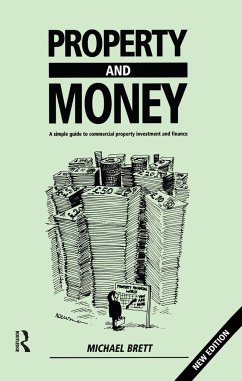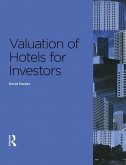Michael Brett
Property and Money
Michael Brett
Property and Money
- Gebundenes Buch
- Merkliste
- Auf die Merkliste
- Bewerten Bewerten
- Teilen
- Produkt teilen
- Produkterinnerung
- Produkterinnerung
Property and Money is a simple guide to the investment and financial aspects of commercial property. Putting property into its financial context, it seeks to bridge the world of the surveyor and property developer and the investment and financial markets of the City of London.
Andere Kunden interessierten sich auch für
![Valuation of Hotels for Investors Valuation of Hotels for Investors]() David HarperValuation of Hotels for Investors203,99 €
David HarperValuation of Hotels for Investors203,99 €![Estimator's Pocket Book Estimator's Pocket Book]() Duncan CartlidgeEstimator's Pocket Book158,99 €
Duncan CartlidgeEstimator's Pocket Book158,99 €![Matrix Methods of Structural Analysis Matrix Methods of Structural Analysis]() Praveen NagarajanMatrix Methods of Structural Analysis181,99 €
Praveen NagarajanMatrix Methods of Structural Analysis181,99 €![Engineering, Business & Professional Ethics Engineering, Business & Professional Ethics]() Simon RobinsonEngineering, Business & Professional Ethics204,99 €
Simon RobinsonEngineering, Business & Professional Ethics204,99 €![Introduction to Modern Infrastructure Construction Introduction to Modern Infrastructure Construction]() George WangIntroduction to Modern Infrastructure Construction157,99 €
George WangIntroduction to Modern Infrastructure Construction157,99 €![Applying a Systems Thinking Approach to the Construction Industry Applying a Systems Thinking Approach to the Construction Industry]() Michael SiebertApplying a Systems Thinking Approach to the Construction Industry182,99 €
Michael SiebertApplying a Systems Thinking Approach to the Construction Industry182,99 €![Transient Airflow in Building Drainage Systems Transient Airflow in Building Drainage Systems]() John SwaffieldTransient Airflow in Building Drainage Systems204,99 €
John SwaffieldTransient Airflow in Building Drainage Systems204,99 €-
-
-
Property and Money is a simple guide to the investment and financial aspects of commercial property. Putting property into its financial context, it seeks to bridge the world of the surveyor and property developer and the investment and financial markets of the City of London.
Hinweis: Dieser Artikel kann nur an eine deutsche Lieferadresse ausgeliefert werden.
Hinweis: Dieser Artikel kann nur an eine deutsche Lieferadresse ausgeliefert werden.
Produktdetails
- Produktdetails
- Verlag: Taylor & Francis Ltd (Sales)
- 2nd edition
- Seitenzahl: 380
- Erscheinungstermin: 1. Februar 2016
- Englisch
- Abmessung: 216mm x 140mm x 22mm
- Gewicht: 590g
- ISBN-13: 9781138169852
- ISBN-10: 1138169854
- Artikelnr.: 45054112
- Herstellerkennzeichnung
- Libri GmbH
- Europaallee 1
- 36244 Bad Hersfeld
- gpsr@libri.de
- Verlag: Taylor & Francis Ltd (Sales)
- 2nd edition
- Seitenzahl: 380
- Erscheinungstermin: 1. Februar 2016
- Englisch
- Abmessung: 216mm x 140mm x 22mm
- Gewicht: 590g
- ISBN-13: 9781138169852
- ISBN-10: 1138169854
- Artikelnr.: 45054112
- Herstellerkennzeichnung
- Libri GmbH
- Europaallee 1
- 36244 Bad Hersfeld
- gpsr@libri.de
Michael Brett is a freelance financial journalist, part-time lecturer on financial topics and author of the business bestseller How to Read the Financial Pages.
Introduction 1. Characteristics of property 2. What we mean by yield 3. Why
values rise and fall 4. Valuing future rental increases 5. Evaluating the
asking price 6. Calculating the actual return 7. Valuating leaseholds 8.
What land is worth 9. Measuring property performance 10. When valuations
are needed 11. How accurate are valuations? 12. Valuing from the armchair
13. Property financing constraints 14. Investors and traders 15. Property
and property company shares 16. Foreword to the figurework 17. Tackling
property company accounts 18. On and off balance sheet 19. Classes of
capital and capital issues 20. Calculating with convertibles 21. The profit
and loss account 22. Profit and loss refinements 23. Untangling a property
trader 24. Off balance sheet traders 25. Cash flow before profit 26.
Launches on the stock market 27. Property company takeovers 28. Categories
of finance 29. Financing with commercial paper 30. Multiplying the
financing options 31. Hedging interest rate risks 32. Borrowing for the
long term 33. Yields and redemption yields 34. Problems of security 35.
Tapping the euromarkets 36. Warrants, options and complex convertibles 37.
Project loans for development 38. Loans with profit share 39. Lenders and
loan enhancements 40. Mortgages for business 41. Credit risk and credit
enhancement 42. Leasebacks old and new 43. Unitisation and securitisation
44. How property bucks the trend 45. Trends in finance and property cycles
46. The crash of the early 1990s 47. Valuing over-rented properties 48.
Phoney rents and true rents 50. Why landlords like headline rents 51.
Valuing with shorter leases 52. Who does what in property
values rise and fall 4. Valuing future rental increases 5. Evaluating the
asking price 6. Calculating the actual return 7. Valuating leaseholds 8.
What land is worth 9. Measuring property performance 10. When valuations
are needed 11. How accurate are valuations? 12. Valuing from the armchair
13. Property financing constraints 14. Investors and traders 15. Property
and property company shares 16. Foreword to the figurework 17. Tackling
property company accounts 18. On and off balance sheet 19. Classes of
capital and capital issues 20. Calculating with convertibles 21. The profit
and loss account 22. Profit and loss refinements 23. Untangling a property
trader 24. Off balance sheet traders 25. Cash flow before profit 26.
Launches on the stock market 27. Property company takeovers 28. Categories
of finance 29. Financing with commercial paper 30. Multiplying the
financing options 31. Hedging interest rate risks 32. Borrowing for the
long term 33. Yields and redemption yields 34. Problems of security 35.
Tapping the euromarkets 36. Warrants, options and complex convertibles 37.
Project loans for development 38. Loans with profit share 39. Lenders and
loan enhancements 40. Mortgages for business 41. Credit risk and credit
enhancement 42. Leasebacks old and new 43. Unitisation and securitisation
44. How property bucks the trend 45. Trends in finance and property cycles
46. The crash of the early 1990s 47. Valuing over-rented properties 48.
Phoney rents and true rents 50. Why landlords like headline rents 51.
Valuing with shorter leases 52. Who does what in property
Introduction 1. Characteristics of property 2. What we mean by yield 3. Why values rise and fall 4. Valuing future rental increases 5. Evaluating the asking price 6. Calculating the actual return 7. Valuating leaseholds 8. What land is worth 9. Measuring property performance 10. When valuations are needed 11. How accurate are valuations? 12. Valuing from the armchair 13. Property financing constraints 14. Investors and traders 15. Property and property company shares 16. Foreword to the figurework 17. Tackling property company accounts 18. On and off balance sheet 19. Classes of capital and capital issues 20. Calculating with convertibles 21. The profit and loss account 22. Profit and loss refinements 23. Untangling a property trader 24. Off balance sheet traders 25. Cash flow before profit 26. Launches on the stock market 27. Property company takeovers 28. Categories of finance 29. Financing with commercial paper 30. Multiplying the financing options 31. Hedging interest rate risks 32. Borrowing for the long term 33. Yields and redemption yields 34. Problems of security 35. Tapping the euromarkets 36. Warrants, options and complex convertibles 37. Project loans for development 38. Loans with profit share 39. Lenders and loan enhancements 40. Mortgages for business 41. Credit risk and credit enhancement 42. Leasebacks old and new 43. Unitisation and securitisation 44. How property bucks the trend 45. Trends in finance and property cycles 46. The crash of the early 1990s 47. Valuing over-rented properties 48. Phoney rents and true rents 50. Why landlords like headline rents 51. Valuing with shorter leases 52. Who does what in property
Introduction 1. Characteristics of property 2. What we mean by yield 3. Why
values rise and fall 4. Valuing future rental increases 5. Evaluating the
asking price 6. Calculating the actual return 7. Valuating leaseholds 8.
What land is worth 9. Measuring property performance 10. When valuations
are needed 11. How accurate are valuations? 12. Valuing from the armchair
13. Property financing constraints 14. Investors and traders 15. Property
and property company shares 16. Foreword to the figurework 17. Tackling
property company accounts 18. On and off balance sheet 19. Classes of
capital and capital issues 20. Calculating with convertibles 21. The profit
and loss account 22. Profit and loss refinements 23. Untangling a property
trader 24. Off balance sheet traders 25. Cash flow before profit 26.
Launches on the stock market 27. Property company takeovers 28. Categories
of finance 29. Financing with commercial paper 30. Multiplying the
financing options 31. Hedging interest rate risks 32. Borrowing for the
long term 33. Yields and redemption yields 34. Problems of security 35.
Tapping the euromarkets 36. Warrants, options and complex convertibles 37.
Project loans for development 38. Loans with profit share 39. Lenders and
loan enhancements 40. Mortgages for business 41. Credit risk and credit
enhancement 42. Leasebacks old and new 43. Unitisation and securitisation
44. How property bucks the trend 45. Trends in finance and property cycles
46. The crash of the early 1990s 47. Valuing over-rented properties 48.
Phoney rents and true rents 50. Why landlords like headline rents 51.
Valuing with shorter leases 52. Who does what in property
values rise and fall 4. Valuing future rental increases 5. Evaluating the
asking price 6. Calculating the actual return 7. Valuating leaseholds 8.
What land is worth 9. Measuring property performance 10. When valuations
are needed 11. How accurate are valuations? 12. Valuing from the armchair
13. Property financing constraints 14. Investors and traders 15. Property
and property company shares 16. Foreword to the figurework 17. Tackling
property company accounts 18. On and off balance sheet 19. Classes of
capital and capital issues 20. Calculating with convertibles 21. The profit
and loss account 22. Profit and loss refinements 23. Untangling a property
trader 24. Off balance sheet traders 25. Cash flow before profit 26.
Launches on the stock market 27. Property company takeovers 28. Categories
of finance 29. Financing with commercial paper 30. Multiplying the
financing options 31. Hedging interest rate risks 32. Borrowing for the
long term 33. Yields and redemption yields 34. Problems of security 35.
Tapping the euromarkets 36. Warrants, options and complex convertibles 37.
Project loans for development 38. Loans with profit share 39. Lenders and
loan enhancements 40. Mortgages for business 41. Credit risk and credit
enhancement 42. Leasebacks old and new 43. Unitisation and securitisation
44. How property bucks the trend 45. Trends in finance and property cycles
46. The crash of the early 1990s 47. Valuing over-rented properties 48.
Phoney rents and true rents 50. Why landlords like headline rents 51.
Valuing with shorter leases 52. Who does what in property
Introduction 1. Characteristics of property 2. What we mean by yield 3. Why values rise and fall 4. Valuing future rental increases 5. Evaluating the asking price 6. Calculating the actual return 7. Valuating leaseholds 8. What land is worth 9. Measuring property performance 10. When valuations are needed 11. How accurate are valuations? 12. Valuing from the armchair 13. Property financing constraints 14. Investors and traders 15. Property and property company shares 16. Foreword to the figurework 17. Tackling property company accounts 18. On and off balance sheet 19. Classes of capital and capital issues 20. Calculating with convertibles 21. The profit and loss account 22. Profit and loss refinements 23. Untangling a property trader 24. Off balance sheet traders 25. Cash flow before profit 26. Launches on the stock market 27. Property company takeovers 28. Categories of finance 29. Financing with commercial paper 30. Multiplying the financing options 31. Hedging interest rate risks 32. Borrowing for the long term 33. Yields and redemption yields 34. Problems of security 35. Tapping the euromarkets 36. Warrants, options and complex convertibles 37. Project loans for development 38. Loans with profit share 39. Lenders and loan enhancements 40. Mortgages for business 41. Credit risk and credit enhancement 42. Leasebacks old and new 43. Unitisation and securitisation 44. How property bucks the trend 45. Trends in finance and property cycles 46. The crash of the early 1990s 47. Valuing over-rented properties 48. Phoney rents and true rents 50. Why landlords like headline rents 51. Valuing with shorter leases 52. Who does what in property








